[Taste buds on the road to travel] The "Three Representatives" of Hangzhou cuisine
[Taste buds on the road to travel] The "Three Representatives" of Hangzhou cuisine
Introduction: The four basic elements of human beings are "food, clothing, housing and transportation". These four elements promote human progress and continue to cycle with the iteration of the process of human civilization. Today, the "travel" of life is superimposed on travel. Not only does it make me feel happy to see what I hear from all directions, but the taste buds on my tongue are also tasting the sour, sweet, bitter, salty and fresh food of life. taste. The dishes eaten during the journey shook history and humanity, so the series of dishes eaten during the journey was written into a document. It's called: "Taste on the Road of Travel".
Coordinates: Qiantongxikou, Wuzhen, Hangzhou, June 2014
I went out for a few days in June and went to Hangzhou, Qiantong, Xikou, Wuzhen and other places. My footprints were only around Zhejiang, and I also tasted a few Hanggang dishes by the way. I am not interested in eating. Whenever I see local snacks introduced in travel posts online, I am indifferent. I basically don't visit those snack streets because I think it's smoky and hot and the sanitary conditions are very poor. Moreover, I have never had the habit of eating while walking. Why I write about Hangbang cuisine this time is because I like West Lake vinegar fish.
Hangbang cuisine refers to the famous dishes that originated or flourished in Hangzhou. Hangzhou cuisine is one of the eight major cuisines in China-the most important branch of Zhejiang cuisine. Hangzhou cuisine pays attention to the original flavor, with fine materials and seasonal considerations. The cooking is orderly, the shape is exquisite, and the color, aroma and taste are complete. Hangzhou cuisine is characterized by "moderate light and light, fine selection of materials, fresh in season, diverse and new". "Light" is an important feature of Hangzhou cuisine.
Today's Hangbang cuisine is "Mizong cuisine". Hangzhou cuisine can be traced back to the Southern Song Dynasty more than a thousand years ago. At that time, Lin 'an was a prosperous Kyoto, with famous chefs from the north and south gathered together, merchants from all walks of life gathered here, and Hangzhou cuisine reached its peak. It is understood that Hangzhou cuisine has historically been divided into two schools: "Hushang" and "Chengxiang". The former is mainly made of fish, shrimp and poultry. It is good at raw frying, clear stewing, tender and other techniques. It pays attention to the clear, fresh, crisp and tender taste, and pays attention to retaining the original flavor. Most of the materials used in the latter are meat, and the cooking methods are mainly steaming, stewing, boiling, and roasting. They pay attention to the taste of light oil, light pulp, light and tender, and pay attention to the combination of fresh and salty.
The most famous place for cooking Hangbang cuisine in Hangzhou is the "Louwailou", but the fees are very expensive there; the most popular place is the "Grandma's Home", which has to queue up every day to get a number before entering for a meal. I passed by "grandma's house" at about 5:30 pm that day and saw people crowded with me waiting to get my number. I had always been afraid of crowded places, so I took a photo from a distance and bid farewell to "grandma's house". Go to a small restaurant on the street instead.
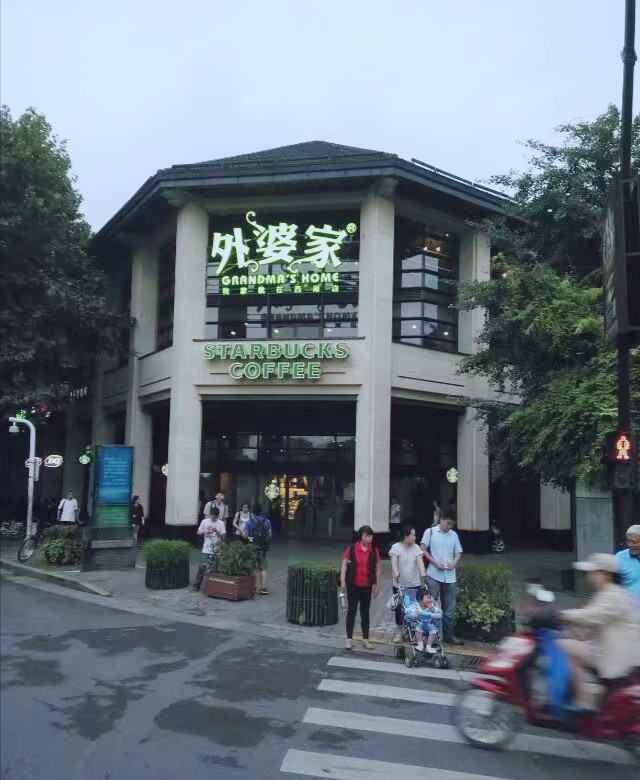
beggar's chicken
There is a famous dish in Beijing cuisine with an interesting name. It is called "Jiaohua Chicken", also known as "Fugui Chicken". There is a reason for naming this dish with completely different words.
"Yaohua chicken"Originally from Hangzhou, Zhejiang Province, it is a chicken that was stolen or solicited by some poor refugees, namely" beggars ". It is cooked in hot soil. It is originally an unrefined street dish. At that time, Emperor Qianlong of the Qing Dynasty visited Jiangnan in disguise and accidentally left his clothes in tatters and left him on the streets. A beggar saw that he was pitiful, so he gave him the "Jiaohua Chicken" that he thought was delicious. Qianlong was tired and hungry. He thought this chicken was extremely delicious, so he asked urgently its name. Jiaohuatou was embarrassed to call this chicken "Jiaohuaji", so he boasted that it was called "Fugui Chicken". After Qianlong heard this, he praised the delicious taste of "Fugui Chicken".
Afterwards, everyone learned that this tramp in tattered clothes was actually the current emperor, and "Jiaohua Chicken" became a famous dish because it was praised by the emperor.

I ordered this dish in a small restaurant in Hangzhou. As soon as the "Jiaohua Chicken" served, I felt that it was not very good. First of all, the color was not pleasant. After taking a bite, I was no longer interested. It lost the original flavor of chicken, just salty.
dongpo meat
Legend 1:
There is an unwritten rule in Yongxiu. For every wedding, when thanking guests, there is an indispensable dish-Dongpo pork.
It is said that there is a beautiful legend about the origin of this Dongpo meat. That year, Su Shi, also known as Su Dongpo, a great scholar of the Song Dynasty, went to Jianchang to visit his close friend Li Gongze. On the way, he saw a farmer's son suffering from heatstroke and was in critical condition. Su Shi, who knew some medical skills, immediately used surgery to save the person with heat stroke, which improved his condition and was out of danger. In order to thank Su Shi for saving his son, the farmer went to the market and weighed two kilograms of meat, tied it with straw and carried it back. The farmer asked Su Shi what flavor he liked. Was the meat roasted or stewed? Su Shi looked at the countryside and thought about the poem. Suddenly he had a good poem and blurted out: "Lotus... pearls... fragrant." The farmer mistakenly thought it "and boiled the grass thoroughly fragrant", so he washed the meat and straw and put it in the pot to simmer it. After the meat was cooked, Su asked why, and the farmer told the great literati. Su Shi said with a smile: "The morning light is bright and colorful, the sky is gorgeous, the lotus fragrance on the water is fragrant, and the morning dew is like beads. Therefore, the master mistakenly wrote the poem 'The pearls on the lotus are fragrant.'" Unexpectedly, the meat is crispy, glutinous and delicious, with strong juice and mellow taste, fat but not greasy, vegetarian but not crispy, and the fragrance of straw in the field, it really has a unique flavor. After Su Dongpo tasted it, he praised it even more. Since then, Jianchang people will make this meat for all thank-you banquets. It has become an indispensable delicacy in folk banquets and is named Dongpo Pork, which has been passed down to this day.
Legend 2
When Su Dongpo was a governor in Hangzhou, he dredged the West Lake and did a good thing for the people.
After the West Lake was dredged, the surrounding fields were no longer afraid of floods and drought. The weather was smooth this year, and the crops in the four townships of Hangzhou were bumper harvests. The common people appreciate the benefits of Su Dongpo dredging the West Lake. During the Chinese New Year, people carrying pigs and wine paid him New Year greetings.
Su Dongpo received a lot of pork and asked someone to cut it into squares. The meat was cooked red and crispy. Then, according to the register of migrant workers dredging the West Lake, he distributed one piece to each family and distributed the meat to everyone for the New Year. In peaceful years, every household lived a very happy life. At this time, when Su Dongpo sent someone to deliver meat, everyone was even happier. The old one smiles, the young one jumps. Everyone praised Su Dongpo as a good official and called the pork he sent "Dongpo Pork". At that time, the owner of a big restaurant saw that everyone praised "Dongpo pork", so he discussed with the chef and cut the pork into squares. The red and crispy meat is also called "Dongpo Pork".
As soon as this new dish came out, the restaurant's business was booming. There were constant customers from morning to night, and killing ten pigs every day was not enough to sell them. The owners of other restaurants were envious and learned to cook. For a time, every restaurant, no matter how big or small, had "Dongpo pork". Later, after public consultation with colleagues,"Dongpo Pork" was designated as the first dish in Hangzhou. Su Dongpo was upright and not afraid of powerful people. The treacherous officials he had offended in the court already hated him very much. At this time, he was very uncomfortable to see that the people in Hangzhou loved him so much. One of them, a censor, accidentally pretended to come to Hangzhou to find trouble and deliberately framed Su Dongpo.
On the first day of the censor's arrival in Hangzhou, he ate in a restaurant. The waiter asked him to order. He looked at the menu and saw that the first dish was "Dongpo Pork". He frowned and thought about it, but he was so happy that he slapped the table and shouted,"I want this first dish."
He had eaten "Dongpo Pork" and thought it tasted really good. When he asked about it, he learned that this "Dongpo Pork" was the first famous dish discussed by his peers. So he collected the recipes of all the restaurants in Hangzhou and excitedly returned to Beijing.
After returning to Beijing, the censor immediately went to see the emperor and said,"Your Majesty, Su Dongpo took bribes and bent the law in Hangzhou and did all evil things! Do the people want to eat his meat?"
The emperor asked: "How did you know? What evidence is there?"
The censor presented the large stack of greasy recipes.
The emperor was a muddlehead. When he saw the recipe, he passed an imperial edict to dismiss Su Dongpo and sent him far away to Hainan.
After Su Dongpo was dismissed from his post and banished from the army, the people in Hangzhou could not forget his benefits and still praised him as in the past. In this way,"Dongpo Pork" has been passed down from generation to generation, and to this day, it is still a famous dish in Hangzhou.

Hangzhou's Dongpo Pork, there is no bundle of straw, and a small piece ranges from 12 to 15 yuan.
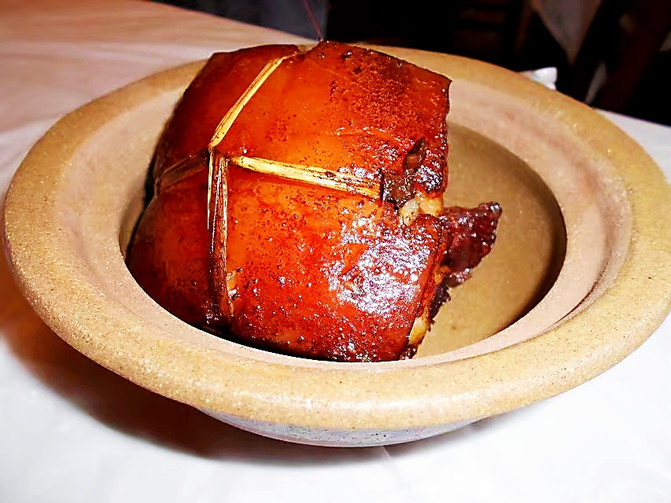

Dongpo Pork from Wuzhen, tied with straw, each piece weighs about three or two, and each piece ranges from 45 to 58 yuan.

I also ordered one in Wuzhengreen vegetables, the portion is not enough for the small dishes in Guangzhou. The asking price is 28 yuan, which is a great slaughter.
West Lake vinegar fish
West Lake vinegar fish is the most famous dish in West Lake, Hangzhou. It was first made during the Gaozong of the Southern Song Dynasty. According to ancient records, the West Lake vinegar fish dish originated from the "secret of uncle and sister-in-law".
Legend has it that during the Southern Song Dynasty, there were two Song brothers who were quite knowledgeable but unwilling to be officials. Therefore, they lived in seclusion in the Jianghu and made a living by fishing. There was a local bully named Zhao Daguan. Seeing that Aunt Song was young and beautiful, he plotted to kill Brother Song and wanted to occupy Aunt Song. At this point, the Song family's uncles and sisters-in-law were devastated. In order to avenge their brother's revenge, the uncle and sister-in-law went to the yamen to complain about injustice. Unexpectedly, the government at that time was in the same breath as the evil forces. If the complaint failed, they were beaten and drove them out of the yamen. After returning home, her sister-in-law had no choice but to ask her brother to flee far away. When her uncle and sister-in-law broke up, Aunt Song cooked a bowl of fish with sugar and vinegar and said to her brother: "This dish is sour and sweet. I hope you will have a day to stand out. Don't forget today's bitterness." Later, Brother Song went out to fight against the Jin Dynasty and made contributions. He returned to Hangzhou and punished the villain, but he could not find out the whereabouts of his sister-in-law. I went out to a banquet once and learned about this dish during the banquet. After inquiry, I learned that my sister-in-law was working as a kitchen worker here under an anonymous name. This was how they reunited. As a result, the beautiful dish "Uncle and Sister-in-law Zhuan Zhen" also spread among the people like legends.
Fang Hengtai, a Qing Dynasty man, wrote a poem titled "West Lake", saying: "There are five willows by the lake of Xiaopo. When you hold up your net, you can get fresh fish. I love silver sword cypress most with sour taste, but I can't compare to river carp and river bream." It tells the cooking and delicacy of West Lake vinegar fish. To the end of the Qing Dynasty, West Lake Vinegar Fish was most famous for being cooked by the West Lake Louwailou Restaurant, and it is still today.
(Incidentally, I recently watched the TV series "Louwailou" and recalled memories of Hangzhou. I really wanted to eat West Lake vinegar fish in Louwailou)
It is not impossible to eat West Lake vinegar fish in Louwailou, but you just need to be patient enough to queue up. We had no choice but to take the next best option and ordered it at a hotel in Hangzhou that day.West Lake vinegar fish, when ordering, the waiter told me that there were no bass left and that I could only use grass carp to make it.

After the fish came, it was sprinkled with a thick layer of juice, which was too sweet. The West Lake vinegar fish I like seemed to be not as delicious as the sweet and sour fish I made myself.

also thesweet and sour pork, the practice is different from that in Guangzhou, where the fillet in Guangzhou is cut into slices, but here it is cut into slices. At first glance, it looks like Guangzhou's sweet and sour pork ribs.
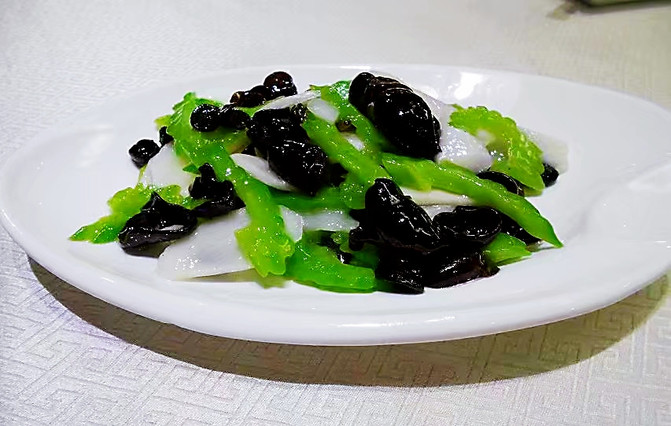
stir-fried fungus with bitter gourdIt looks very good, the color is pleasant and clear.
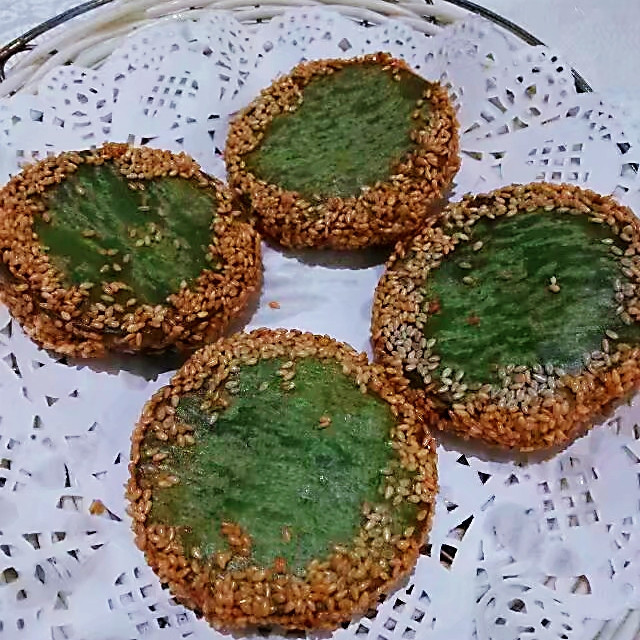
do likeGreen tea cake, the outside is green, the edge is dipped with sesame seeds, and the inside is wrapped with pumpkin stuffing. It is sweet, fragrant and very delicious.
There are three treasures in Xikou: peaches, taro, and thousand-layer cakes
The peach is not yet in time.
Taro, also known as taro,Jiangnan water towns can be seen everywhere。However, the taro from other real estate properties are smaller. Compared with Xikou taro, it is like a grandson to a grandfather, not a little bit worse. The taro at Xikou has a great "meat" aroma that will never be forgotten by anyone who has been here and tasted. It is mainly because of the irrigation of clear river water, coupled with the local soil and weather, which are particularly favorable to the growth of taro.
It is said that the mountains on the other side of the Yan River are like two dragons, and the two dragons are playing with pearls. The big taro here is the dragon pearl. Don't tell me, these Xikou taro are really like dragon balls. It was 15 yuan per catty. I picked the smallest one and spent 9 yuan. It was really pink and fragrant, and I still wanted to eat it again after being eaten.


While visiting the former residence of Jiang's family in Xikou, I ate at the restaurant designated by the tour guide at noon and ordered aStewed pork ribs with taro, there are only a few taro pieces, three bones that are not even worth ribs at all, but the asking price is 48 yuan, and there is one morestir-fried amaranth, asking price is 18 yuan! I'm really cheating you for not discussing it!
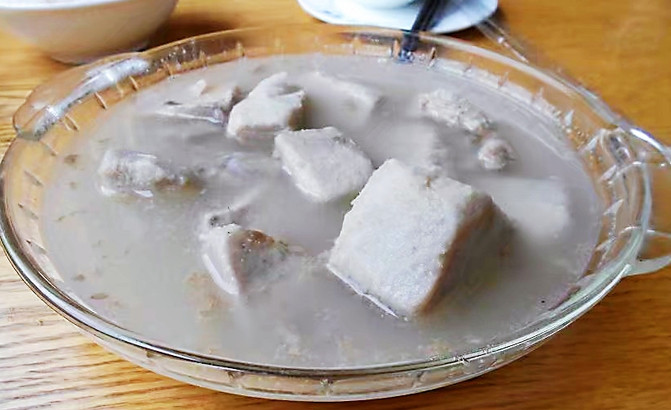


lasagnaFounded during the Qianlong period of the Qing Dynasty, it has a history of more than 200 years. Its raw material is mainly flour, added with white sugar, sesame seeds, peanuts and an appropriate amount of moss powder. After twelve cake-making processes, especially the last baking process, great attention must be paid to and the fire is appropriate to make it into food with excellent color, aroma and taste. The thousand-layer cake is about two centimeters thick and has at least twenty-seven overlapping layers of thin slices. It is crispy and mellow, extremely crunchy, moderately sweet and salty, and fragrant on the teeth.
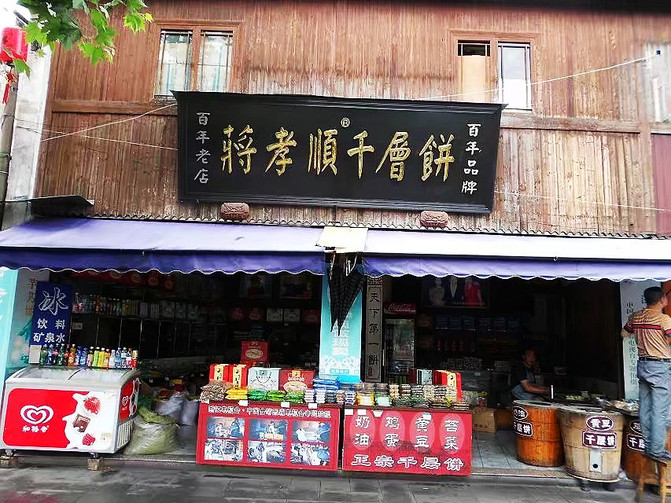

Make thousand-layer cakes on site

Buy home's thousand-layer cakes
By the way, I want to explain:
Three treasures of former children-tofu, fragrant dried meat, hollow rot。It is said that these are common items on the dining table, but they fascinate all tourists who come to the table. The reasons are that in addition to the fact that the "Qiantong Three Treasures" uses the unique local organic Zaoxinghe Emperor beans planted in mountains above 500 meters above sea level, it uses first-class water quality originating from the East Zhejiang Grand Canyon, and it is also a secret and non-inheritable traditional craftsmanship, making Qiantong tofu white, tender, smooth, fresh and fragrant; fragrant, smooth, thin and tough, firm, chewy, and endless aftertaste; hollow rot is golden in color and hollow outside. There are also many varieties such as Qianzhang, tofu skin, smoked tofu, five-spice tofu, tofu buns, tofu bubbles, etc. Tofu alone can make a tofu banquet with full color, aroma and flavor. To eat the "Qian Tong Three Treasures", you must eat the original flavor. To eat the original flavor, pour the mixed juice on the freshly made tofu and sprinkle with two or three chopped chives. The aroma of tofu in your mouth is enough to make you reminisce for a few days. Another cup of freshly ground soy milk. The strong soy milk presents the light yellow color of beans. Take a sip, and the rich flavor will overflow in your mouth, with endless aftertaste.


After I came back, I read this online introduction and regretted that I didn't taste it before my child. I should at least drink a cup of freshly ground soy milk! Unfortunately, because of the short stay in Qiantong, I had no chance to enjoy the delicious food there.
Every time I travel, I have regrets. Because of this, I have the next trip. I would rather miss the food than the scenery. In fact, each of us is constantly walking, either here or there, and every time we walk leaves a deep or shallow mark.
These "three representatives" focus on the hub between the tip of the tongue and the brain, tendons and collaterals. The first represents "Jiaohua Chicken", which tells the story of a beggar becoming acquainted with Emperor Qianlong; the second represents "Dongpo Meat", which tells the story of Mr. Su Dongbo, who was outstanding in literature, virtue and talent during the Song Dynasty, but was taken over by a traitor censor based on this "meat"; the third represents "West Lake Vinegar Fish" interprets the bitterness and bitterness of the Song family's uncles and sisters-in-law's struggle against a bully in the Southern Song Dynasty! On the tip of the tongue of China, every dish can be said to be a good dish that satisfies the taste buds, but also a wonderful song that refreshes the mind!
(4328 1407)
Previous Article:"Night snack Jianghu" Chinese barbecue ceiling "Old Lady Sita"| Fu Jiajun, the "top manager": The chef must choose the best meat cutting chef
